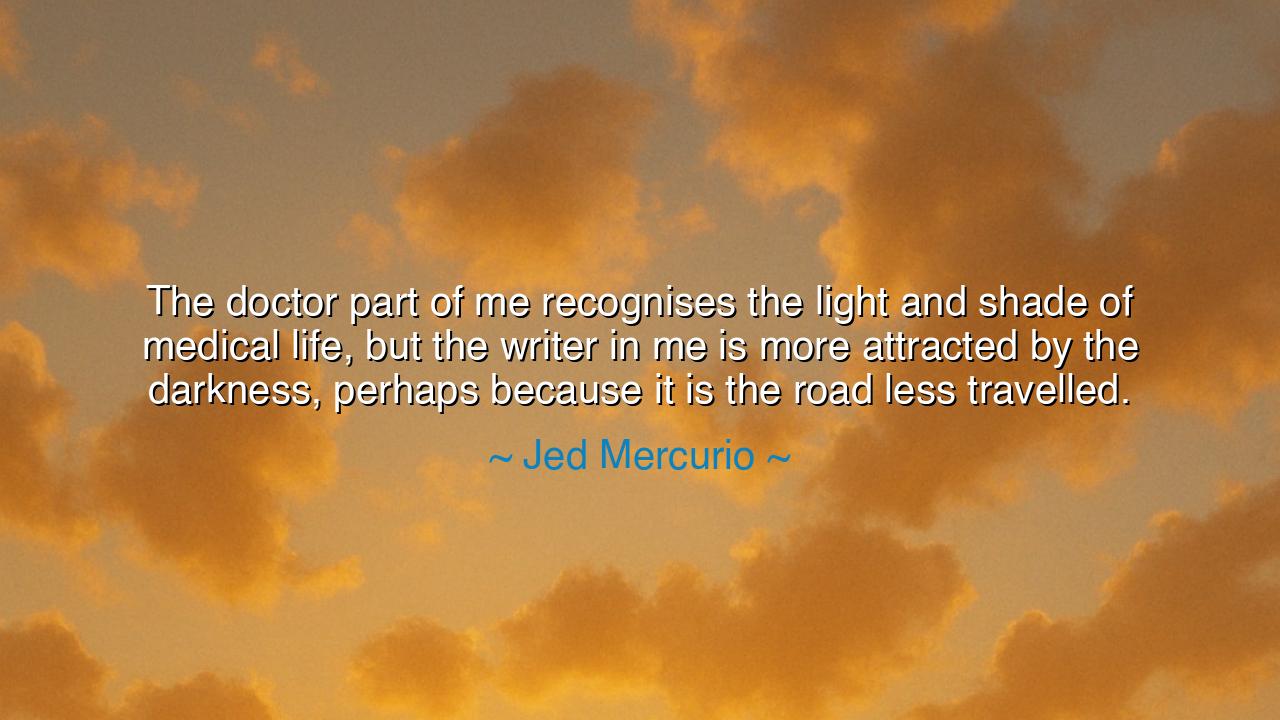
The doctor part of me recognises the light and shade of medical
The doctor part of me recognises the light and shade of medical life, but the writer in me is more attracted by the darkness, perhaps because it is the road less travelled.






The words of Jed Mercurio—“The doctor part of me recognises the light and shade of medical life, but the writer in me is more attracted by the darkness, perhaps because it is the road less travelled.”—speak to the eternal struggle between duty and curiosity, between the comfort of order and the allure of mystery. In these words lies not only the voice of a storyteller, but of a seeker of truth—a man who has walked the clean corridors of hospitals by day and wandered the shadowed corridors of the human soul by night. His reflection captures an ancient truth: that light and darkness are not enemies, but teachers, and that wisdom is born only when one dares to look into both.
To understand Mercurio’s words, we must first know his journey. Before he was a writer, he was a doctor—a man of science trained to heal, to preserve life, to navigate the fragile balance between sickness and recovery. In medicine, there is order, clarity, and discipline. There are rules to follow, lives to save, and griefs to manage. But within every physician, there also lies the awareness of darkness—of mistakes made, of human weakness, of the quiet tragedies that unfold behind closed curtains. The doctor learns to live with the tension between hope and despair, between the miracle of survival and the inevitability of death. Mercurio’s quote is the confession of one who has seen both, and who understands that art begins where certainty ends.
The origin of this insight lies in Mercurio’s own transition from healer to storyteller. In his medical dramas—such as Bodies and Cardiac Arrest—he does not glorify medicine; he exposes it. He shows the beauty of compassion, yes, but also the corruption of ego, the exhaustion of spirit, and the quiet cruelty of institutional indifference. His “darkness” is not the grotesque or the sensational—it is the truth that many dare not face: that those who heal are also human, and that within hospitals, as within all human endeavors, light and shadow coexist. The doctor in him sees both; the writer in him seeks to illuminate what others turn away from.
This fascination with the darker side of life has ancient echoes. The Greek tragedians, too, understood that wisdom is born from suffering, not serenity. Sophocles, in his Oedipus Rex, revealed that even the noble and wise are blind to their own darkness until fate unmasks them. The philosopher Heraclitus taught that “the way up and the way down are one and the same.” Mercurio’s “road less travelled” is this very descent into human imperfection, the path that leads not away from truth but into its depths. It is a dangerous road, for those who walk it must confront what others hide from: guilt, failure, hypocrisy, and moral ambiguity. Yet only by entering the darkness can one understand the light.
Mercurio’s words also remind us that art and medicine share a sacred kinship. Both are concerned with the human condition—one heals the body, the other heals understanding. But while medicine seeks to repair, art seeks to reveal. The doctor comforts, but the writer confronts. The doctor must preserve faith in order; the writer must question it. In this balance, Mercurio finds his dual nature: one half bound to duty, the other compelled toward truth, even when truth is painful. His choice to follow the “road less travelled” marks the path of all true artists—those who, rather than celebrating perfection, uncover the fractures that make humanity real.
Consider the example of Anton Chekhov, who, like Mercurio, was both doctor and writer. Chekhov once said, “Medicine is my lawful wife and literature is my mistress.” He treated the sick with compassion but turned to writing to explore the wounds that medicine could not heal—the loneliness, fear, and yearning that live within every human heart. Through his stories, he showed that the soul’s maladies are as complex as the body’s, and that art is the only medicine for the spirit. Like Chekhov, Mercurio understands that darkness is not something to be feared, but something to be understood and translated, so that others might see themselves more clearly.
The lesson in Mercurio’s words is clear: do not fear the darkness within life, nor within yourself. The light may comfort, but the darkness teaches. To avoid what is difficult or uncomfortable is to live only half a life. The road less travelled is the one that leads inward—through struggle, through doubt, through honesty. Whether one is a doctor, a teacher, a parent, or an artist, the courage to face reality in all its imperfection is what makes a soul wise. The surface world may offer safety, but the depths offer truth.
So let us take from Jed Mercurio’s wisdom a guide for our own journeys: live with both light and shadow, and never turn away from what is real. Seek authenticity over approval, truth over comfort, and depth over ease. For the heart that dares to look into darkness will one day return carrying light—not borrowed or imagined, but hard-earned and enduring. And in that light, every soul that follows will find not despair, but understanding, not fear, but freedom.






AAdministratorAdministrator
Welcome, honored guests. Please leave a comment, we will respond soon